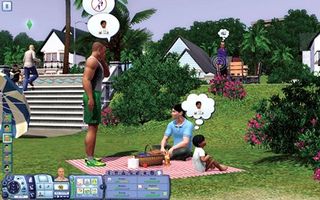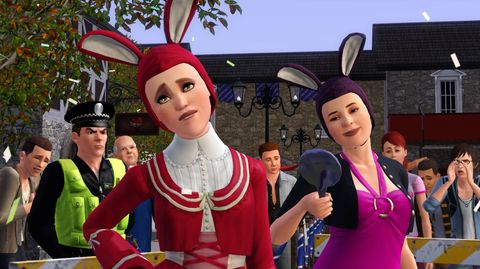The Sims 3, like the previous games, is all about controlling people. You begin by moulding their appearance (bearded, thinnish, roguishly handsome), selecting their five personality traits (Childish, Good, Friendly, Artistic, Computer Whizz) and dropping them into their own home in suburbia (two-bedroom, single floor, modest). In the original game, what followed inevitably trapped you into being a kind of incorporeal maid, buying the furniture and making sure your little masters didn’t wet themselves.

Those days are gone. Set their free will to full and your Sims are now capable of maintaining their own needs: Hunger, Social, Bladder, Hygiene, Energy, Fun. Stick the game on fast forward, wander off, and when you return your characters will have showered, used the toilet and gone off to work all by themselves. You can, if you want, completely ignore their needs and focus on the far more enjoyable job of fulfilling their wishes.
Replacing the system of wants and fears from The Sims 2, Wishes take two forms. Lifetime Wishes are chosen when you first create a Sim and limited by your selected personality traits. Along the way, smaller wishes inspired by the events in a Sim’s life present themselves. When your Sim wishes something, you can dismiss it or promise to make it happen. There’s no punishment for failure, but accomplishing wishes gathers Lifetime Happiness points that can be spent on special rewards. Like, for example, a fertility treatment that increases the chance of twins and triplets. A ghost seen, a wife married, a newly learned recipe and some guitar practice later, little Ada and Boudica are born.

Wishes not only give your play direction, but meaning. Events inspire wishes. The fulfillment of wishes in turn inspires more events. Life moves forward in a compulsive loop of improving skills, gaining promotions and buying new stuff, all of it purposeful because your Sim wanted it, and had a reason for wanting it.
Broadly defined, there are three roles a Sims player can assume: The Narcissist, who creates their own lives in lovingly accurate or idealised detail; The Soap Writer, who crafts tales of illicit affairs and melodrama; and The Sociopath, who locks Sims in a room, removes the door and watches unfeelingly as they weep, collapse, and eventually starve to death.

Modeling Sims on yourself and your loved ones changes the way you play. The callous whims that might otherwise dictate your decisions are now too uncomfortable to pursue. The great flaw of The Sims, unchanged in The Sims 3, is that accomplishing this goal renders the game boring. Each day becomes rote: go to work, come home, help the kids, kiss my wife, go to bed and start over. We know this from every other storytelling medium: the most interesting lives involve suffering.

